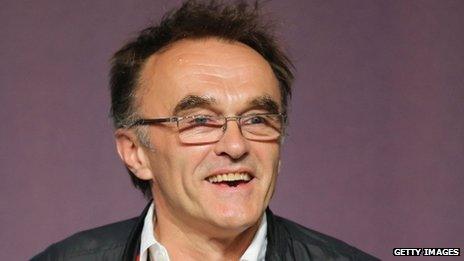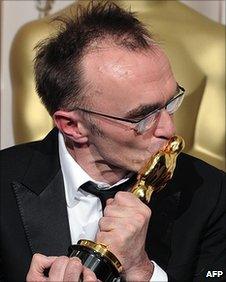Profile: Danny Boyle, director of the Olympic opening ceremony
- Published

Danny Boyle's Isles of Wonder was inspired by a speech from The Tempest
He is best known for directing Oscar-winning movie Slumdog Millionaire and Trainspotting, one of the most popular films of the 90s.
But British film-maker Danny Boyle has added another string to his bow, as the artistic director of the London 2012 Olympic opening ceremony.
Boyle came up with the "Isles of Wonder" theme after gaining inspiration from Caliban's speech in The Tempest which opens with the line: "Be not afeard; the isle is full of noises."
With thousands of volunteers involved in the Olympic extravaganza, one of Boyle's biggest challenges has been keeping the content a secret.
In early July, he apologised to volunteers over "spoilers" appearing in the press. In an email, he asked them to "stay virtuous" and "protect the show".
Organisers have released a short clip from the dress rehearsal of the Olympic Games opening ceremony
For the 55-year-old from Manchester, becoming a movie director was a far cry from his first career choice - to train as a priest.
At the age of 14, Boyle began to make arrangements to attend a seminary, before a priest warned him against it.
"Whether he was saving me from the priesthood or saving the priesthood from me, I don't know. But quite soon after, I started doing drama," Boyle told The Telegraph.
Boyle began his new career in theatre, landing the job of deputy director at the Royal Court, before moving to the BBC to work as a producer.
He produced a number of TV films, including Alan Clarke's Elephant, before becoming a director on several episodes of Inspector Morse and the 1993 series Mr Wroe's Virgins.
His first feature, the low-budget 1994 movie Shallow Grave, starring Ewan McGregor and Christopher Eccleston, was a surprise hit.
It also marked the beginning of the successful relationship between Boyle, McGregor, producer Andrew Macdonald and writer John Hodge.
Boyle won a Bafta award and was named best British newcomer at the London Critics Circle Film Awards.
But it was the 1996 adaptation of Irvine Welsh's Trainspotting two years later that really got people talking about the director.
The movie picked up an Oscar, which went to Hodge for his screenplay, and was a massive commercial success, propelling the careers of McGregor and co-stars Jonny Lee Miller and Robert Carlyle.
Screened out of competition at the Cannes Film Festival, Trainspotting went on to become the highest-grossing British film that year.
Boyle's next movie - A Life Less Ordinary - saw him once again joining forces with Hodge, Macdonald and McGregor.
In 2000, Boyle made his first big-budget Hollywood feature The Beach, which was based on Alex Garland's acclaimed novel of the same name.
However, the changed-ending of the movie left audiences unsatisfied and the film failed to match box office expectations.
It was the casting of Leonardo DiCaprio in the lead role that created headlines and led to the demise of McGregor and Boyle's working relationship.
The Scottish actor revealed that he had been due to play the lead until DiCaprio stepped in.
In 2000, Boyle spoke about their spat and told The Independent newspaper that McGregor "feels we betrayed him, and I think he's right."
And five years later, McGregor himself opened up to US magazine Playboy about his feelings over their argument.
"We had a director-actor relationship unlike any other I've had. But Boyle and his people didn't treat me very well."
Bafta interruption
It has been reported that the pair have put their differences behind them, but there have been no plans to make Porno - the follow-up to Trainspotting - despite Boyle apparently being keen.

Slumdog Millionaire won Boyle his first Oscar
After The Beach, Boyle made a couple of TV movies, before returning to the big screen with 28 Days Later (2002), Millions (2004) and Sunshine (2007).
But it was his 2009 movie Slumdog Millionaire that led to the film-maker walking away with his first Oscar for best director.
The movie, which starred Dev Patel and Freida Pinto, scooped a further seven Academy Awards.
But it was Boyle's acceptance speech at the Baftas a few weeks earlier that was the most memorable, as he was interrupted by his proud son sitting in the audience, who shouted: "I love you Dad."
Boyle then went on to pay tribute to his father's neighbours, who had helped him out with a technical glitch the night the ceremony was broadcast.
"The wiring in my dad's house blew overnight, so a big shout out to everyone who helped him get the extension cable in so he could watch this on television," he said.
Made for a modest £10.1m, the movie made £255m at the worldwide box office and also took four Golden Globe trophies and six Critics' Choice Awards.
The film also highlighted the squalid conditions young homeless children are forced to live with in Mumbai - where the movie was set.
Boyle helped to set up a trust for the young actors who starred in the movie and who were themselves brought up in the Mumbai slums.
The outsider
Despite the tremendous Oscar win and new-found Hollywood fame, he did not make a move to the US.
In an interview with the BBC in January 2011, Boyle said living in the UK kept him grounded.
"There's nothing wrong with Hollywood. If you want to be a big-time director, then you should go. But I've been very fortunate to be able to stay here."
After Slumdog, Boyle turned to the intense subject of Aron Ralston, the mountain climber who had to amputate his own arm after being trapped by a boulder for nearly five days.
His film 127 Hours notched up three Golden Globe, nine Bafta and six Oscar nominations, including three best actor nods for its star James Franco.
In 2011, Boyle returned to the theatre, with a widely-acclaimed production of Frankenstein. It saw lead actors Benedict Cumberbatch and Jonny Lee Miller alternate the roles of Frankenstein and the Creature.
On the morning of 27 July 2012, the half tonne bell that featured in Frankenstein was rung as part of the All The Bells celebration that took place across the UK.
Now Boyle's stage is the floor of the Olympic Stadium, where the opening ceremony could prove to be one of his most memorable productions yet.
- Published4 July 2012
- Published27 January 2012
- Published24 February 2011
- Published4 January 2011
- Published13 August 2010